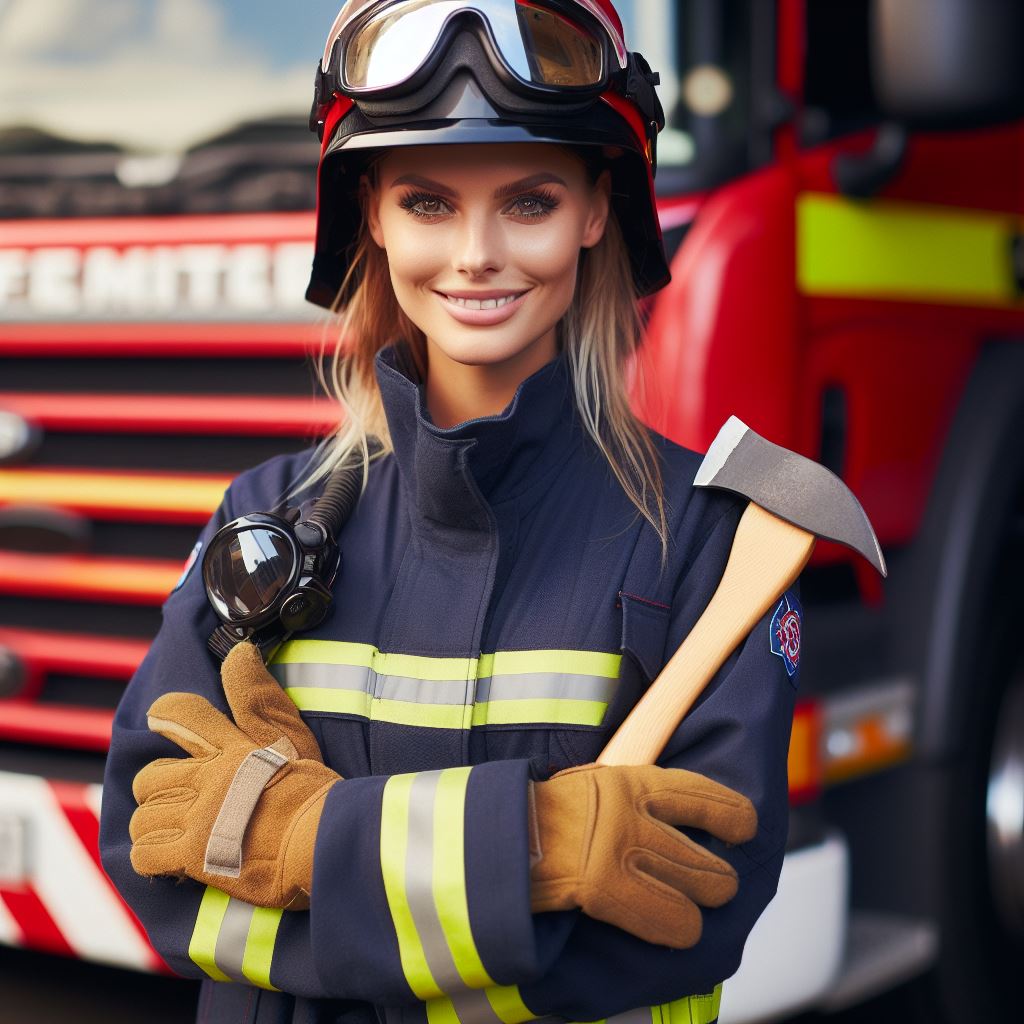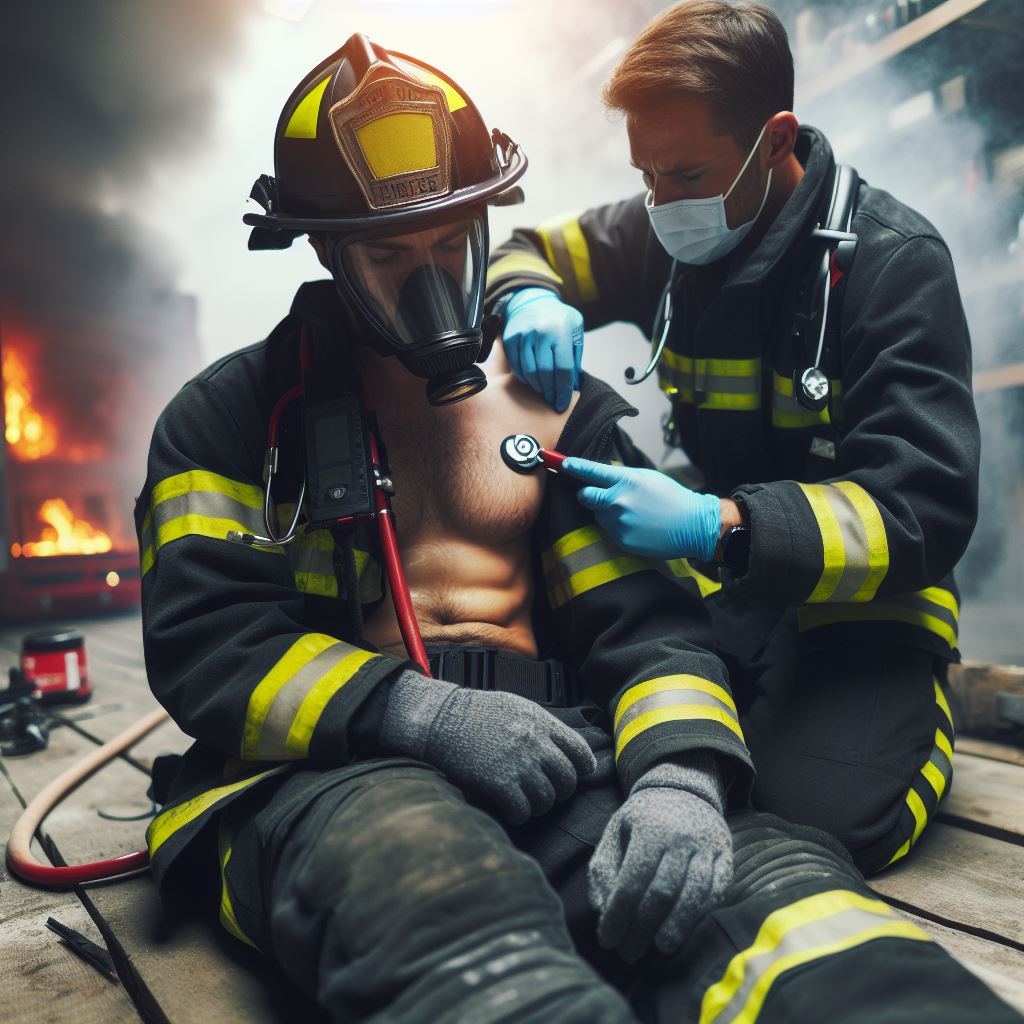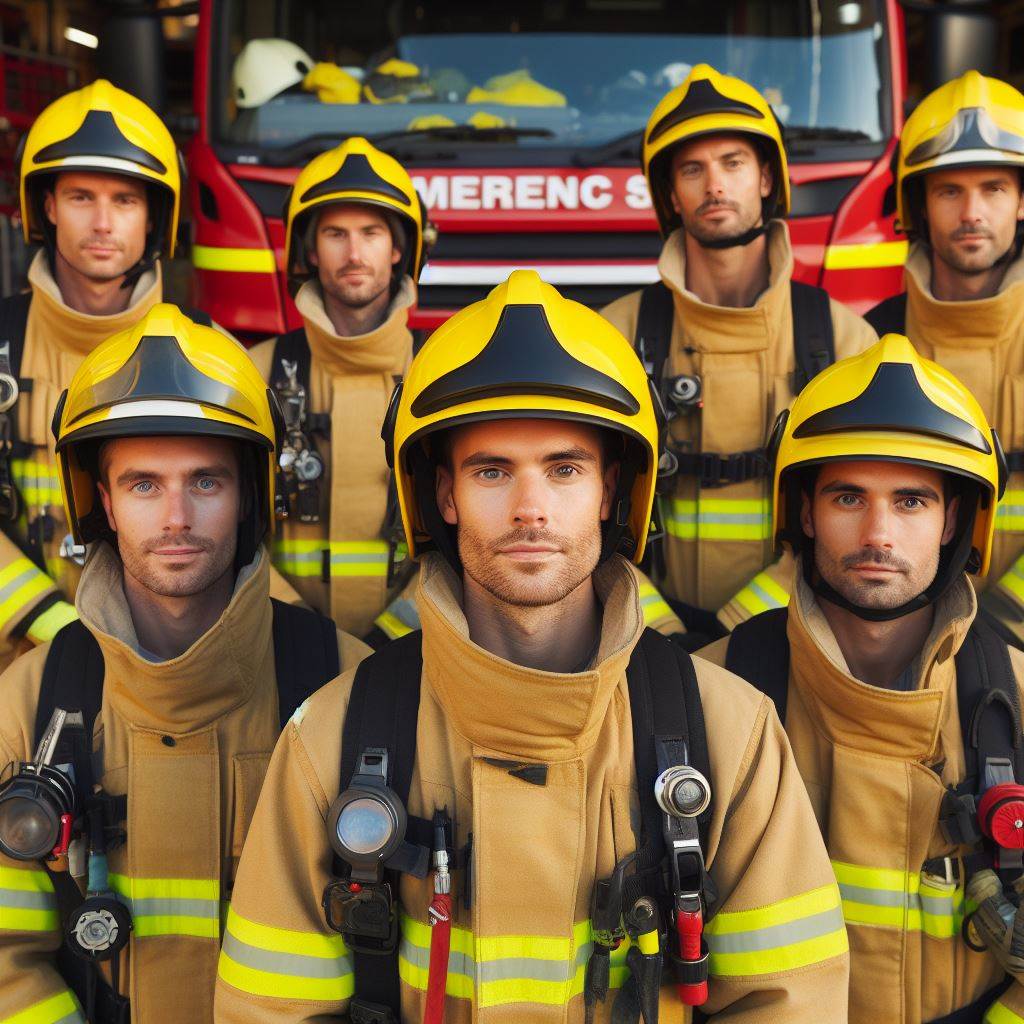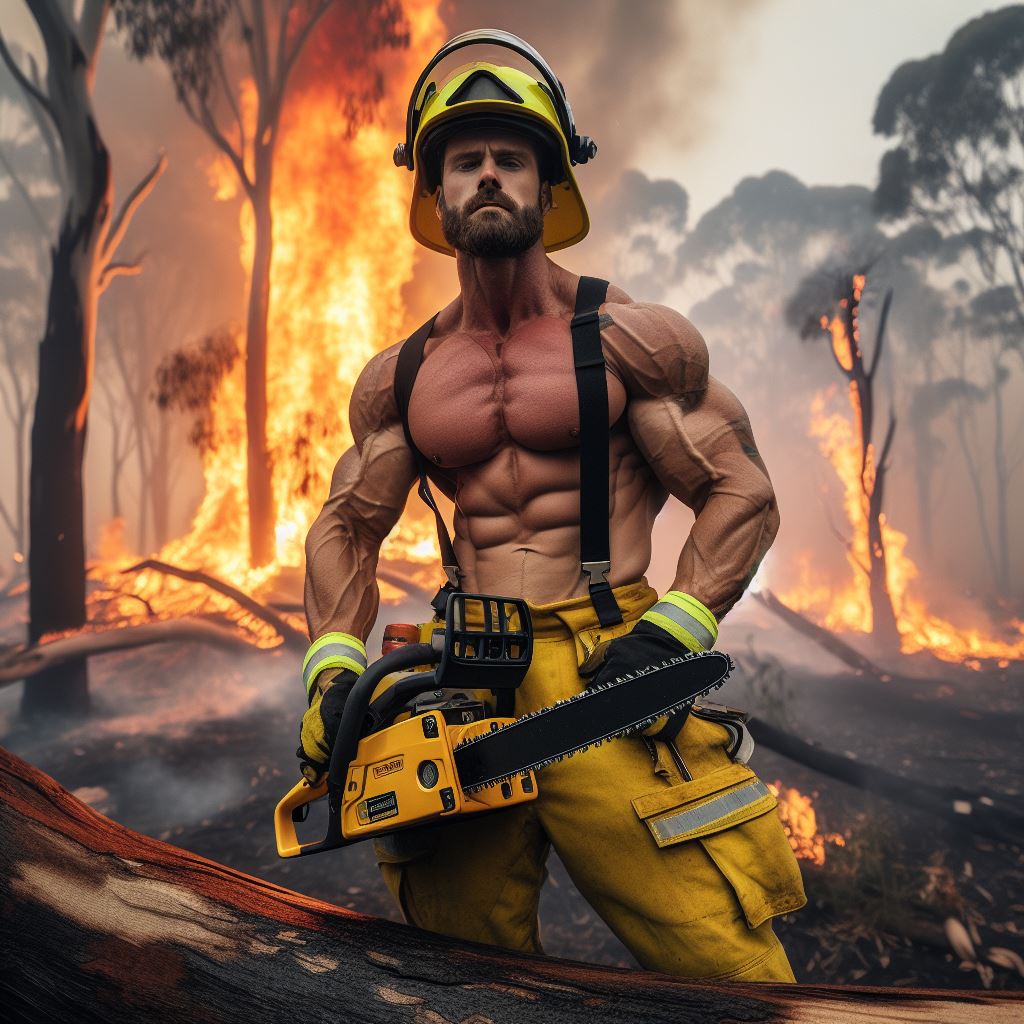Introduction
Firefighting is a challenging and noble career in Australia that demands immense courage and bravery. This blog chapter explores the tremendous qualities and skills required to become a firefighter while emphasizing their importance in this profession.
In order to succeed in the firefighting career in Australia, individuals must possess unwavering courage, physical endurance, and a deep sense of empathy.
Firefighters in Australia face numerous challenges that demand exceptional courage and bravery. Their role involves risking their lives to save others and protect property from devastating fires.
In addition to their primary duties, firefighters also provide emergency medical assistance and rescue services. The courage required to face dangerous situations head-on distinguishes firefighters as true heroes.
Firefighters must undergo rigorous training and possess exceptional physical endurance to carry out their duties effectively. Their training includes exercises that simulate real-life emergencies, ensuring they are well-prepared for any situation.
Apart from physical fitness, firefighters also need emotional strength to cope with the trauma they witness. The ability to remain calm under pressure and make split-second decisions is crucial in firefighting.
The courage displayed by firefighters inspires communities and fosters a sense of security and trust. In review, becoming a firefighter in Australia requires individuals with a unique combination of courage, physical endurance, and empathy.
Their selflessness and bravery make them true heroes who are willing to sacrifice everything to protect others.
Overview of the Firefighting Profession
Firefighting is a noble and courageous profession that involves risking one’s life to save others and protect property. Firefighters are highly trained and skilled individuals who are always prepared to respond to emergencies.
What firefighting entails
- Firefighters are responsible for extinguishing fires in various settings, including residential, commercial, and wildland areas.
- They are trained to use specialized equipment and techniques to control and suppress fires effectively.
- Firefighters also play a crucial role in preventing fires through public education, safety inspections, and enforcing fire codes.
Primary responsibilities and duties of firefighters
- Responding promptly to emergency calls and assessing the situation to determine the appropriate action.
- Rescuing individuals from dangerous situations, such as burning buildings or trapped vehicles.
- Operating firefighting equipment, such as fire engines, hoses, and ladders, to combat fires.
- Performing search and rescue operations to locate and evacuate people in distress.
- Providing medical care and first aid to individuals at the scene of emergencies.
- Conducting fire investigations to determine the cause and origin of fires.
Different types of emergencies firefighters respond to
Structure Fires
- Firefighters are often called to extinguish fires in residential and commercial buildings.
- They must navigate through smoke-filled environments and unstable structures to save lives and minimize property damage.
Wildfires
- Firefighters combat wildfires in forested areas, grasslands, or any other natural environment.
- They employ various strategies, including creating firebreaks and conducting controlled burns, to contain and extinguish the fire.
Hazmat Incidents
- Firefighters are trained to respond to chemical, biological, radiological, and nuclear emergencies.
- They mitigate the risks associated with hazardous materials, ensuring public safety and environmental protection.
Vehicle Accidents
- Firefighters rescue individuals trapped in vehicles involved in accidents.
- They provide immediate medical assistance while working to safely extricate the victims.
Medical Emergencies
- Firefighters often work alongside paramedics to provide basic life support until advanced medical help arrives.
- They administer CPR, control bleeding, and stabilize patients in critical conditions.
Technical Rescue Operations
- Firefighters are called upon to rescue people trapped in confined spaces, high-angle environments, or collapsed structures.
- They use specialized equipment and techniques to safely extract individuals and provide medical attention.
In a nutshell, firefighting is a challenging yet rewarding profession that requires bravery, physical fitness, and extensive training. Firefighters selflessly put themselves in harm’s way to protect life and property, and their dedication is commendable.
Their ability to respond to and handle various types of emergencies makes them indispensable members of society.
Read: How to Become a Police Officer in Australia
Requirements and qualifications
Educational Requirements and Certifications
- Completion of Year 12 or equivalent education is generally required for firefighter positions.
- Many firefighting agencies in Australia require candidates to hold a Certificate II or III in Public Safety (Firefighting Operations).
- Obtaining a Diploma of Public Safety (Firefighting Management) can enhance career prospects.
- Additional certifications, such as First Aid and CPR, are often mandatory for firefighters.
- Some agencies also require candidates to possess a current driver’s license.
Physical Fitness Standards
- All applicants must pass a comprehensive physical fitness test to become a firefighter in Australia.
- The test includes tasks such as ladder climbs, hose dragging, equipment carrying, and simulated rescue scenarios.
- Candidates must have good overall physical fitness, strength, endurance, and flexibility.
- They must also demonstrate the ability to work well under pressure and in high-stress situations.
- Firefighters are expected to maintain their fitness and regularly engage in physical training throughout their careers.
Additional Skills and Qualities
- Strong teamwork and communication skills are highly valued in the firefighting profession.
- Firefighters need to be able to effectively communicate with their team members and other emergency personnel.
- Problem-solving skills and the ability to think quickly and make critical decisions are essential.
- Demonstrating composure and resilience in challenging situations is crucial for firefighters.
- Flexibility and adaptability to changing circumstances are essential qualities for success in this career.
- Firefighters must have a strong commitment to public safety and the well-being of the community they serve.
- Being resourceful, self-disciplined, and having a strong work ethic are highly valued in the profession.
- Firefighters should also possess a high level of integrity and be able to maintain confidentiality and trust.
In review, becoming a firefighter in Australia requires a combination of educational qualifications, certifications, physical fitness, and a range of skills and qualities. Candidates must complete their education up to Year 12 and obtain specific certifications in firefighting operations.
They also need to meet the physical fitness standards set by firefighting agencies, demonstrating their overall fitness, strength, and endurance. Additionally, skills such as teamwork, communication, problem-solving, composure, and resilience are highly valued in this profession.
A commitment to public safety, resourcefulness, self-discipline, integrity, and a strong work ethic will contribute to a successful career as a firefighter in Oz.
Read: Day in the Life of an Aussie Police Officer
Training and Preparation
Being a firefighter requires a high level of training and preparation. Here are the key aspects:
Training Process for Aspiring Firefighters
- Aspiring firefighters need to complete a rigorous training program to acquire the necessary skills.
- The training process includes both theoretical classroom sessions and practical hands-on training.
- Trainees learn about fire behavior, hazardous materials, firefighting techniques, and emergency medical procedures.
- They also receive training in using firefighting equipment such as hoses, ladders, and breathing apparatus.
- Physical fitness and endurance are crucial aspects of firefighting training.
- Trainees undergo rigorous physical exercises to develop strength, agility, and stamina.
- They are extensively trained in performing tasks under stressful and demanding conditions.
- Trainees are taught about teamwork, communication, and effective decision-making during emergencies.
- Throughout the training process, trainees are evaluated through exams, practical assessments, and simulations.
Various Training Programs Available in Australia
- Australia offers a range of training programs for aspiring firefighters.
- The State Fire and Rescue Services run comprehensive training academies across the country.
- These academies provide both recruit training and ongoing professional development programs.
- Some universities and vocational institutions offer firefighting courses with hands-on training opportunities.
- The programs cover firefighting techniques, emergency response, and specialized areas like hazardous materials or technical rescue.
- Volunteer fire services also provide training for individuals willing to serve their communities.
- These programs allow aspiring firefighters to gain valuable experience while making a difference.
- Successful completion of an accredited training program is mandatory to become a professional firefighter in Australia.
Physical and Mental Preparation for the Job
- Firefighting is a physically demanding job that requires both strength and agility.
- Aspiring firefighters need to engage in regular physical exercise and maintain a healthy lifestyle.
- Focus on cardiovascular fitness, muscular strength, and flexibility is essential.
- Developing mental resilience is equally crucial for firefighters facing challenging and unpredictable situations.
- Regular practice of stress management techniques like meditation or breathing exercises can help.
- Firefighters should be prepared to work in hazardous environments and deal with traumatic incidents.
- Maintaining a positive attitude, adaptability, and the ability to stay calm under pressure are vital traits.
- Joining local volunteer organizations or participating in community activities can provide valuable experience.
- Mentoring programs and shadowing experienced firefighters can help aspiring firefighters gain insights into the job.
Basically, the path to becoming a firefighter in Australia involves completing a rigorous training program. Aspiring firefighters have access to various training opportunities that equip them with the necessary skills.
Physical and mental preparation is key to handle the demanding nature of the job. By investing in training and preparation, aspiring firefighters can embark on a career dedicated to protecting lives and property.
Read: Diplomatic Immunity: The Basics

Challenges and risks
The inherent dangers and risks associated with firefighting
Inherent dangers and risks associated with firefighting make it a daunting and courageous career choice.
The physical and emotional toll firefighting can take on individuals
Firefighters face physical threats like smoke inhalation, burns, and collapsing structures on a regular basis. The emotional toll of witnessing trauma, injuries, and death can be overwhelming for firefighters.
Rapid decision-making under intense pressure is necessary, putting their lives at risk in dangerous situations. Firefighting requires individuals to work in extreme temperatures, with heavy gear and limited visibility.
Firefighters often have to enter burning buildings, where the risk of explosions and sudden fire outbreaks is high. The nature of the job demands the ability to cope with high levels of stress, both during and after emergencies.
Post-traumatic stress disorder (PTSD) is a significant risk for firefighters due to their exposure to traumatic events. Firefighters are also prone to physical injuries such as sprains, fractures, and back problems from the demanding tasks.
Smoke and toxic fumes can lead to long-term respiratory problems, including lung cancer and asthma among firefighters.
The unpredictable nature of fires makes it challenging to anticipate the course of action, increasing the risks involved.
Firefighters need to stay updated with the latest techniques and equipment to effectively combat evolving fire hazards.
The constant exposure to life-threatening situations can lead to cumulative stress and chronic mental health issues.
Firefighters may face criticism and scrutiny from the public, adding to the already stressful nature of their profession.
The importance of mental health support within the profession
The importance of mental health support within the firefighting profession cannot be overstated. Adequate counseling and therapy resources should be provided to help firefighters cope with the emotional aftermath of incidents.
Regular debriefing sessions can facilitate the sharing of experiences and emotions within the firefighting community. Peer support programs can be established to create a safe space for firefighters to discuss their mental health concerns.
Promoting a culture of understanding and empathy will encourage firefighters to seek help for mental health challenges. Preventive measures like offering resilience training can build coping skills before firefighters face critical incidents.
Firefighters should be encouraged to take breaks and have time for self-care to prevent burnout and mental exhaustion. Ensuring a healthy work-life balance and supporting firefighters’ personal lives is crucial for their overall wellbeing.
Investments in research and development can lead to advancements in protective gear, minimizing risks for firefighters. Public awareness campaigns can educate the community about the challenges firefighters face and the support they need.
Recognizing the sacrifices and bravery of firefighters is essential to inspire new recruits and retain experienced professionals.
In general, firefighting is undoubtedly a career that demands tremendous courage and resilience. The inherent dangers and risks can take a toll on both the physical and emotional wellbeing of individuals.
Therefore, it is crucial to prioritize mental health support within the firefighting profession to ensure the overall wellness of these brave individuals who selflessly protect their communities.
Read: Understanding Ranks in Australian Police Force
Your Personalized Career Strategy
Unlock your potential with tailored career consulting. Get clear, actionable steps designed for your success. Start now!
Get StartedUncover the Details: Foreign Policy Analysis by AU Analysts
Find Out More: The Role of Police in Australian Communities
Rewards and Benefits of Being a Firefighter in Australia
Being a firefighter in Australia comes with numerous rewards and benefits that make it a rewarding and fulfilling career choice. Here are some of the key advantages:
Saving Lives and Protecting Communities
- Firefighters have the unique opportunity to save lives and protect their communities from various emergencies.
- They play a crucial role in rescuing people from burning buildings, vehicle accidents, and hazardous situations.
- Contributing to the well-being and safety of others provides a profound sense of fulfillment and purpose.
Job Security and Stability
- The demand for firefighters in Australia remains consistently high, ensuring job security and stability.
- Firefighters are essential emergency service personnel, and their roles are integral to the functioning of society.
- Government funding and support further guarantee the longevity of firefighting careers.
Competitive Salary and Benefits
- Firefighters receive a competitive salary that reflects the demanding nature of their work.
- In addition to the base pay, they often have access to overtime pay, benefits packages, and retirement plans.
- Health insurance and specialized training opportunities are also provided to ensure their well-being and professional development.
Unique Perks and Opportunities
- Firefighters frequently receive special allowances due to their hazardous work, such as additional leave or higher pay rates.
- Many fire departments offer flexible work schedules, allowing firefighters to balance their professional and personal lives effectively.
- Opportunities for career advancement and specialization are plentiful, including roles in leadership, training, or specialized rescue teams.
Strong Camaraderie and Teamwork
- Firefighters rely on close-knit teamwork and camaraderie to perform their duties effectively.
- The bonds formed among firefighters foster an incredible sense of belonging and support.
- Working alongside like-minded individuals creates lifelong friendships and an invaluable support network.
Personal Growth and Development
- Being a firefighter requires continuous learning and development.
- Firefighters are regularly trained in various areas, including fire suppression techniques, emergency medical services, and rescue operations.
- They acquire a vast range of transferrable skills, enhancing their personal and professional growth.
Public Recognition and Respect
- Firefighters enjoy immense public recognition, respect, and gratitude for their heroic actions.
- They are regarded as selfless individuals who put their lives on the line to protect others.
- Community appreciation and gratitude further contribute to the sense of pride and fulfillment in the firefighting profession.
Overall, being a firefighter in Australia offers a rewarding career filled with purpose, personal growth, and a strong sense of community service. The rewards go beyond financial compensation, as firefighters make a lasting impact on the lives they save and the communities they protect.
Career Progression and Opportunities
Firefighting is a noble profession that offers immense potential for career growth and advancement. As firefighters gain experience and expertise, various pathways and specializations become available to them.
Moreover, there are ample opportunities for promotion and advancement within the firefighting profession.
Potential for Career Growth
- Firefighting offers a dynamic and challenging work environment that fosters personal and professional growth.
- Continual expansion of skills and knowledge by firefighters opens doors to higher positions and increased responsibilities.
- Each successful operation helps firefighters develop strong leadership qualities, boosting their chances of career progression.
- Ongoing training and the pursuit of advanced certifications enhance firefighters’ marketability and prospects for growth.
- Many fire departments provide specialized training programs that can lead to career advancement and higher-ranked positions.
Different Pathways and Specializations
- Firefighters can choose to specialize in various areas such as hazmat (hazardous materials), technical rescues, or wildland firefighting.
- Specializing in hazmat allows firefighters to handle and mitigate chemical, biological, and radioactive emergencies.
- Technical rescues involve specialized skills to save individuals trapped in confined spaces, collapsed structures, or high-angle situations.
- Wildland firefighting provides opportunities to combat wildfires in forests and rural areas, protecting lives and natural resources.
- Fire inspectors and investigators specialize in identifying the causes and origins of fires, playing a critical role in prevention and safety.
Opportunities for Promotion and Advancement
- Firefighters can progress to higher ranks such as Fire Engineer, Lieutenant, Captain, Battalion Chief, and ultimately, Fire Chief.
- Advancement opportunities often require meeting specific criteria, including years of service, advanced certifications, and demonstrated leadership abilities.
- Firefighters pursuing higher education degrees in fields like fire science or emergency management can stand out for promotions.
- Fire departments may offer promotional exams, assessing candidates’ knowledge, skills, and aptitude for managerial roles.
- Successful promotion not only brings higher pay and benefits, but it also allows firefighters to exercise greater leadership and influence.
As firefighters progress in their careers, they also have the chance to make a positive impact on their communities by mentoring and training new recruits.
Moreover, experienced firefighters often serve as incident commanders during critical emergencies, showcasing their expertise in managing complex situations.
Generally, the firefighting profession offers abundant opportunities for career growth and progression. Through continuous learning, honing specialized skills, and demonstrating leadership, firefighters can reach higher ranks and assume more challenging roles.
Specializations such as hazmat, technical rescues, wildland firefighting, and fire investigation present diverse pathways for advancement. By seizing these opportunities, firefighters can have a fulfilling and rewarding career serving their communities with courage in Oz.
Conclusion
Recap of the main points discussed in the blog post, emphasizing the courage and dedication required to pursue a career in firefighting, and leaving the audience with a final thought or call to action related to the topic.
In closing, firefighting is an incredibly demanding and courageous career in Oz. We explored the challenges faced by firefighters, such as risking their lives to save others and battling unpredictable infernos. Their dedication to serving the community is commendable.
The bravery exhibited by firefighters cannot be overstated. They willingly put themselves in harm’s way, confronting the destructive forces of fire with unwavering determination. Their selflessness and commitment to ensuring the safety and well-being of others is an inspiration to us all.
If you have ever considered a career in firefighting, take a moment to appreciate the immense courage it demands. Realize that not only will you be putting your own life on the line, but you will also be making a profound impact on the lives of countless individuals in your community.
Let this serve as a call to action for those who have been inspired by the bravery of firefighters. Support your local firefighting departments by volunteering, donating, or advocating for better resources and training.
Together, we can ensure that these courageous individuals have the necessary tools and support they need to continue their invaluable work in protecting and saving lives.
Remember, firefighters are the embodiment of courage. They are the heroes who rush toward danger while others flee. Their dedication and sacrifice deserve our utmost respect and gratitude.




